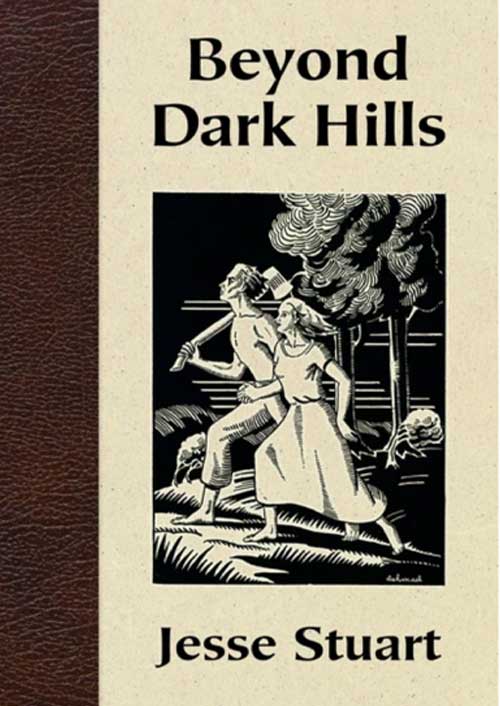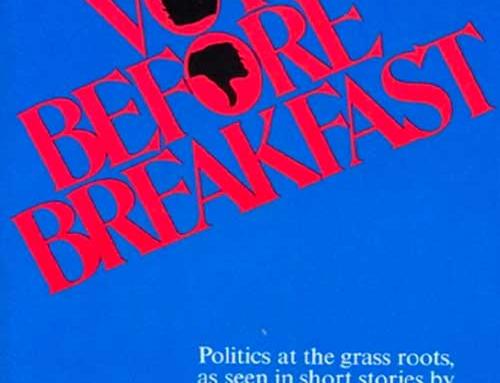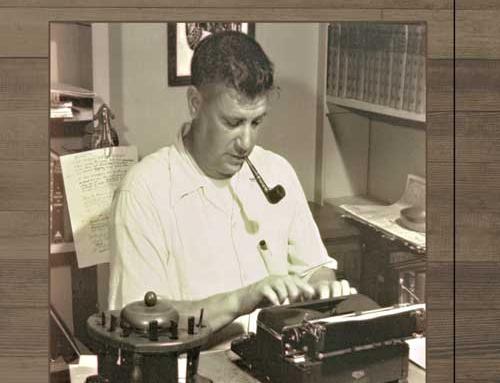In 1985, I moved to Ashland to assume the executive and literary leadership of the Jesse Stuart Foundation, an organization that had been created in 1979, five years before Stuart’s death, to manage his literary estate. With assistance from hundreds of people, including Keith Kappes, a Vice President at Morehead State University, Judy B. Thomas, President of the Ashland Oil Foundation, and former state librarian Wayne Onkst, I have transformed the JSF into a significant regional publishing house. Over the last 37 years, the JSF has published more than 150 books, including valuable works by Jesse Stuart, Allan W. Eckert, Billy C. Clark, Thomas D. Clark, Harry Monroe Caudill, Edwina Pendarvis, and dozens of other important Kentucky and Appalachian authors. The numerous awards and honors we have received – including the 2021 Milner Award, the highest honor given by the Kentucky Arts Council – have brought regional, state, and national recognition to Ashland, Kentucky, and northeastern Kentucky.
 Jesse Stuart’s literary achievements are only part of an incredibly active life that embraced other careers such as farmer and conservationist, editor and United States naval officer, teacher and administrator, and lecturer and international man of letters. He was also a man of public commitment and philanthropy, giving half the value of his land, modestly valued then at 1.2 million dollars, to the people of Kentucky in order to establish the Jesse Stuart Nature Preserve, thus saving for all time the old stands of timber and pasture lands teeming with wildlife in W-Hollow.
Jesse Stuart’s literary achievements are only part of an incredibly active life that embraced other careers such as farmer and conservationist, editor and United States naval officer, teacher and administrator, and lecturer and international man of letters. He was also a man of public commitment and philanthropy, giving half the value of his land, modestly valued then at 1.2 million dollars, to the people of Kentucky in order to establish the Jesse Stuart Nature Preserve, thus saving for all time the old stands of timber and pasture lands teeming with wildlife in W-Hollow.
Stuart’s enduring contributions are numerous and have yet to be completely understood and measured. During the last twenty years of his life, he suffered eight heart attacks and two strokes, the last stroke denying him the use of his voice and, according to his doctors, his consciousness. Because of his inability to swallow and other difficulties requiring close medical attention, his last difficult months were spent in the Jo-Lin Health Care Center in Ironton, Ohio, fifteen miles from his beloved home in W-Hollow. A final onslaught of “intractable heart failure” took his life on the afternoon of February 17, 1984.
Today, in the Plum Grove Cemetery, a tablet-shaped gravestone of durable Vermont granite shoulders its way to the sky, standing as tall and strong as the man it memorializes. Stuart’s land has a voice, and so does this stone. One side depicts a carved bull-tongue plow, the symbol of the farmer; the other side a lamp and book, suggesting the teacher; the back of the stone reveals a scene of nature – trees and mountains caught in the setting sun, into which curves a modern highway, dramatizing the possible harmony of conservation and human progress in which the man-artist believed. Under each symbol are related lines from Jesse Stuart’s works, bringing light to the symbols. And on the front of the stone are “The Kingdom of God/Is Within You,” the sculpted pen and scroll of the poet,
Jesse
Hilton Stuart
Aug. 8, 1906
Feb. 17, 1984
and below a Latin cross these lines from “Album of Destiny:”
What is life worth when we’re afraid to live,
When we as humans dodge what Nature’s given?
What is life worth when we take and don’t give,
And when the best in us will not awaken?
What is a lamp without a burning flame?
What is the human brain without insight
To guide us from the night from whence we came
Through paths uncertain to the morning’s light?
Do not the flowers look to morning’s light
With strength from roots in earth securely fastened?
Should not man look to morning for his light
Before his body fails, his life wasted?
Life is no more than wind unless we give,
True to our hearts, true to our fellow-men,
That we may in the finish when we leave
Triumph in life that surely comes again.
Indeed, life is no more than wind unless we give. I have given more than forty years of my life to the Jesse Stuart Foundation and to the people of my adopted home of Ashland, Kentucky. For the past 14 years, I have worked without a salary or any other financial recompence to strengthen the JSF’s future. Through my efforts, I invite you to give – give your talents, energy, and resources to an organization that has given so much to this community.
If my comments inspire your interest in Jesse Stuart, I encourage you to read “Beyond Dark Hills,” a Stuart autobiography that focuses on his early life, his struggles to get an education, and his early years as a teacher and writer. For more information, contact the Jesse Stuart Foundation at 606-326-1667 or e-mail jsf@jsfbooks.com.
By James M. Gifford
JSF CEO & Senior Editor
In 1985, I moved to Ashland to assume the executive and literary leadership of the Jesse Stuart Foundation, an organization that had been created in 1979, five years before Stuart’s death, to manage his literary estate. With assistance from hundreds of people, including Keith Kappes, a Vice President at Morehead State University, Judy B. Thomas, President of the Ashland Oil Foundation, and former state librarian Wayne Onkst, I have transformed the JSF into a significant regional publishing house. Over the last 37 years, the JSF has published more than 150 books, including valuable works by Jesse Stuart, Allan W. Eckert, Billy C. Clark, Thomas D. Clark, Harry Monroe Caudill, Edwina Pendarvis, and dozens of other important Kentucky and Appalachian authors. The numerous awards and honors we have received – including the 2021 Milner Award, the highest honor given by the Kentucky Arts Council – have brought regional, state, and national recognition to Ashland, Kentucky, and northeastern Kentucky.

Jesse Stuart’s literary achievements are only part of an incredibly active life that embraced other careers such as farmer and conservationist, editor and United States naval officer, teacher and administrator, and lecturer and international man of letters. He was also a man of public commitment and philanthropy, giving half the value of his land, modestly valued then at 1.2 million dollars, to the people of Kentucky in order to establish the Jesse Stuart Nature Preserve, thus saving for all time the old stands of timber and pasture lands teeming with wildlife in W-Hollow.
Stuart’s enduring contributions are numerous and have yet to be completely understood and measured. During the last twenty years of his life, he suffered eight heart attacks and two strokes, the last stroke denying him the use of his voice and, according to his doctors, his consciousness. Because of his inability to swallow and other difficulties requiring close medical attention, his last difficult months were spent in the Jo-Lin Health Care Center in Ironton, Ohio, fifteen miles from his beloved home in W-Hollow. A final onslaught of “intractable heart failure” took his life on the afternoon of February 17, 1984.
Today, in the Plum Grove Cemetery, a tablet-shaped gravestone of durable Vermont granite shoulders its way to the sky, standing as tall and strong as the man it memorializes. Stuart’s land has a voice, and so does this stone. One side depicts a carved bull-tongue plow, the symbol of the farmer; the other side a lamp and book, suggesting the teacher; the back of the stone reveals a scene of nature – trees and mountains caught in the setting sun, into which curves a modern highway, dramatizing the possible harmony of conservation and human progress in which the man-artist believed. Under each symbol are related lines from Jesse Stuart’s works, bringing light to the symbols. And on the front of the stone are “The Kingdom of God/Is Within You,” the sculpted pen and scroll of the poet,
Jesse
Hilton Stuart
Aug. 8, 1906
Feb. 17, 1984
and below a Latin cross these lines from “Album of Destiny:”
What is life worth when we’re afraid to live,
When we as humans dodge what Nature’s given?
What is life worth when we take and don’t give,
And when the best in us will not awaken?
What is a lamp without a burning flame?
What is the human brain without insight
To guide us from the night from whence we came
Through paths uncertain to the morning’s light?
Do not the flowers look to morning’s light
With strength from roots in earth securely fastened?
Should not man look to morning for his light
Before his body fails, his life wasted?
Life is no more than wind unless we give,
True to our hearts, true to our fellow-men,
That we may in the finish when we leave
Triumph in life that surely comes again.
Indeed, life is no more than wind unless we give. I have given more than forty years of my life to the Jesse Stuart Foundation and to the people of my adopted home of Ashland, Kentucky. For the past 14 years, I have worked without a salary or any other financial recompence to strengthen the JSF’s future. Through my efforts, I invite you to give – give your talents, energy, and resources to an organization that has given so much to this community.
If my comments inspire your interest in Jesse Stuart, I encourage you to read “Beyond Dark Hills,” a Stuart autobiography that focuses on his early life, his struggles to get an education, and his early years as a teacher and writer. For more information, contact the Jesse Stuart Foundation at 606-326-1667 or e-mail jsf@jsfbooks.com.
By James M. Gifford
JSF CEO & Senior Editor



